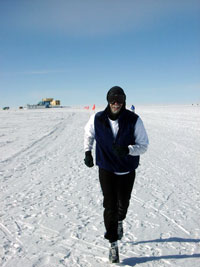Two New Zealand men walk to South Pole for white Christmas
Two New Zealand men walking unaided to the South Pole and back have only one wish for Christmas a smooth ice sheet.

"The best Christmas present we could have would be a nice, flat surface," as it will involve "a lot of walking," adventurer Kevin Biggar told New Zealand's National Radio Friday as the pair prepared to reach the pole by early January.
Biggar and Jamie Fitzgerald were on their 40th day of walking, dragging sleds behind them on frequently rough terrain, as they trek to the world's most inhospitable southern point.
After a short celebration, they plan to turn around and head back to the Antarctic coast, to complete their journey of more than 2,400 kilometers (1,500 miles).
The two men are bidding to become the first team to walk to the South Pole and back without being resupplied. The feat will mark the 50th anniversary of the founding of Scott Base, New Zealand's Antarctic research base on the southern continent.
Having already won the trans-Atlantic rowing race in 40 days, the two are no strangers to putting their bodies on the line.
"We've now been walking for 40 days and there's still a long, long way to go," Fitzgerald said. "We're very confident we'll be there within another 10 days ... around the end of the year perhaps," Fitzgerald said.
While they had planned for the trip to be tough "for the first two weeks ... it was very, very tough going" as they each pulled sleds with more than 150 kilograms (330 pounds) of equipment behind them, he said.
After very slow initial progress they were "a bit behind schedule but we worked very, very hard to get back" on track to try to meet their 49-day target to walk from the northern Antarctic coast to the South Pole. They plan to reach the pole by no later than Jan. 4. Then they have to turn around and retrace their journey.
The pair are traveling alone and without outside support, something that's never been done before, reports AP.
They plan to walk about 24.6 kilometers (15.4 miles) for at least 11 hours each bitingly cold day before they reach the South Pole. With temperatures hovering around minus 25 degrees Celsius (minus 13 F), the pair must also contend with strong head winds and wind chill. Each man has lost more than 15 kilograms (33 pounds) over the 40 days so far.
When mist and clouds close in, Biggar said, the "whiteout is really like walking inside a ping pong ball. You can't see what you're walking into." But the 24-hour daylight has helped, he added.
A deep crevasse field had slowed progress earlier in their journey.
Biggar said he had taken a tumble into a crevasse, "not very far, I was too fat for it," he joked.
"We've only got so many days of food and fuel so we planned on getting back to the coast three times faster than we take to get to the South Pole" using wind kites to speed them across the wilderness, he said.
"We have the prevailing wind on our side on the way back," so "wind permitting we'll be kiting back," Fitzgerald said.
Subscribe to Pravda.Ru Telegram channel, Facebook, RSS!




